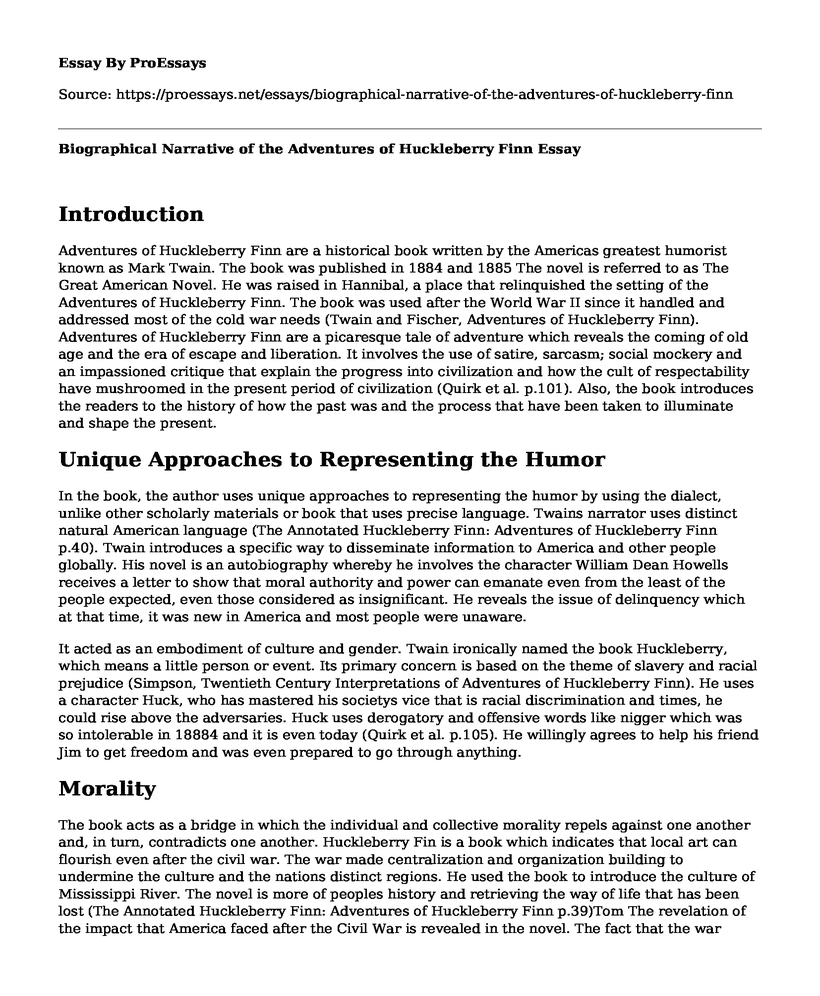Introduction
Adventures of Huckleberry Finn are a historical book written by the Americas greatest humorist known as Mark Twain. The book was published in 1884 and 1885 The novel is referred to as The Great American Novel. He was raised in Hannibal, a place that relinquished the setting of the Adventures of Huckleberry Finn. The book was used after the World War II since it handled and addressed most of the cold war needs (Twain and Fischer, Adventures of Huckleberry Finn). Adventures of Huckleberry Finn are a picaresque tale of adventure which reveals the coming of old age and the era of escape and liberation. It involves the use of satire, sarcasm; social mockery and an impassioned critique that explain the progress into civilization and how the cult of respectability have mushroomed in the present period of civilization (Quirk et al. p.101). Also, the book introduces the readers to the history of how the past was and the process that have been taken to illuminate and shape the present.
Unique Approaches to Representing the Humor
In the book, the author uses unique approaches to representing the humor by using the dialect, unlike other scholarly materials or book that uses precise language. Twains narrator uses distinct natural American language (The Annotated Huckleberry Finn: Adventures of Huckleberry Finn p.40). Twain introduces a specific way to disseminate information to America and other people globally. His novel is an autobiography whereby he involves the character William Dean Howells receives a letter to show that moral authority and power can emanate even from the least of the people expected, even those considered as insignificant. He reveals the issue of delinquency which at that time, it was new in America and most people were unaware.
It acted as an embodiment of culture and gender. Twain ironically named the book Huckleberry, which means a little person or event. Its primary concern is based on the theme of slavery and racial prejudice (Simpson, Twentieth Century Interpretations of Adventures of Huckleberry Finn). He uses a character Huck, who has mastered his societys vice that is racial discrimination and times, he could rise above the adversaries. Huck uses derogatory and offensive words like nigger which was so intolerable in 18884 and it is even today (Quirk et al. p.105). He willingly agrees to help his friend Jim to get freedom and was even prepared to go through anything.
Morality
The book acts as a bridge in which the individual and collective morality repels against one another and, in turn, contradicts one another. Huckleberry Fin is a book which indicates that local art can flourish even after the civil war. The war made centralization and organization building to undermine the culture and the nations distinct regions. He used the book to introduce the culture of Mississippi River. The novel is more of peoples history and retrieving the way of life that has been lost (The Annotated Huckleberry Finn: Adventures of Huckleberry Finn p.39)Tom The revelation of the impact that America faced after the Civil War is revealed in the novel. The fact that the war brought brutality made Twain think of a more idealistic and a humorous way to represent the themes especially that of racism. He reveals how he not only abhors the act but wanted people to wake up from the stupor.
The adventures were made in the urban and industrial America. It is set to bring out the concept of childhood, risks, discovery and also experience. In the novel Twain reveals the vice in the society through the character Huck who steals, smokes, lies and skips school (Butrym, Alexander and Mark Twain, The Adventures of Huckleberry Finn). Nevertheless, he is not greedy for power since he accepts no authority from his father or the Widow Douglas. The central part that fascinates people is the harrowing odyssey of adventure and the perfect freedom from all the restraints.
References
Butrym, Alexander J. Mark Twain's the Adventures of Huckleberry Finn. New York: Barnes & Noble Books, 1997. Print.
Simpson, Claude M. Twentieth Century Interpretations Of Adventures Of Huckleberry Finn. Englewood Cliffs, N.J.: Prentice-Hall, 1968. Print.
"The Annotated Huckleberry Finn: Adventures Of Huckleberry Finn (Tom Sawyer's Comrade)." Choice Reviews Online 39.07 (2002): 39-3854-39-3854. Web.
Twain, Mark, and Victor Fischer. Adventures Of Huckleberry Finn. Berkeley: University of California Press, 2001. Print.
Quirk, Tom et al. "Adventures of Huckleberry Finn. American Literature 62.1 (1990): 105. Web.
Cite this page
Biographical Narrative of the Adventures of Huckleberry Finn. (2021, Mar 09). Retrieved from https://proessays.net/essays/biographical-narrative-of-the-adventures-of-huckleberry-finn
If you are the original author of this essay and no longer wish to have it published on the ProEssays website, please click below to request its removal:
- A Literary Essay Sample: Value of Transparency and Vices of Secrecy in The Circle
- Walt Whitman's Influence on Allen Ginsberg and William Carlos Williams Essay
- Essay Sample on Presumption of Innocence
- Shakespeare and the Portrayal of Women: Macbeth and Romeo and Juliet
- Essay on Jimmy Santiago Baca's Journey of Finding His Voice
- Uncovering Greek Mythology's Influence in Modern Life - Essay Sample
- Poetry Analysis Essay on Claude McKay's America: Love & Mixed Feelings in 1921







